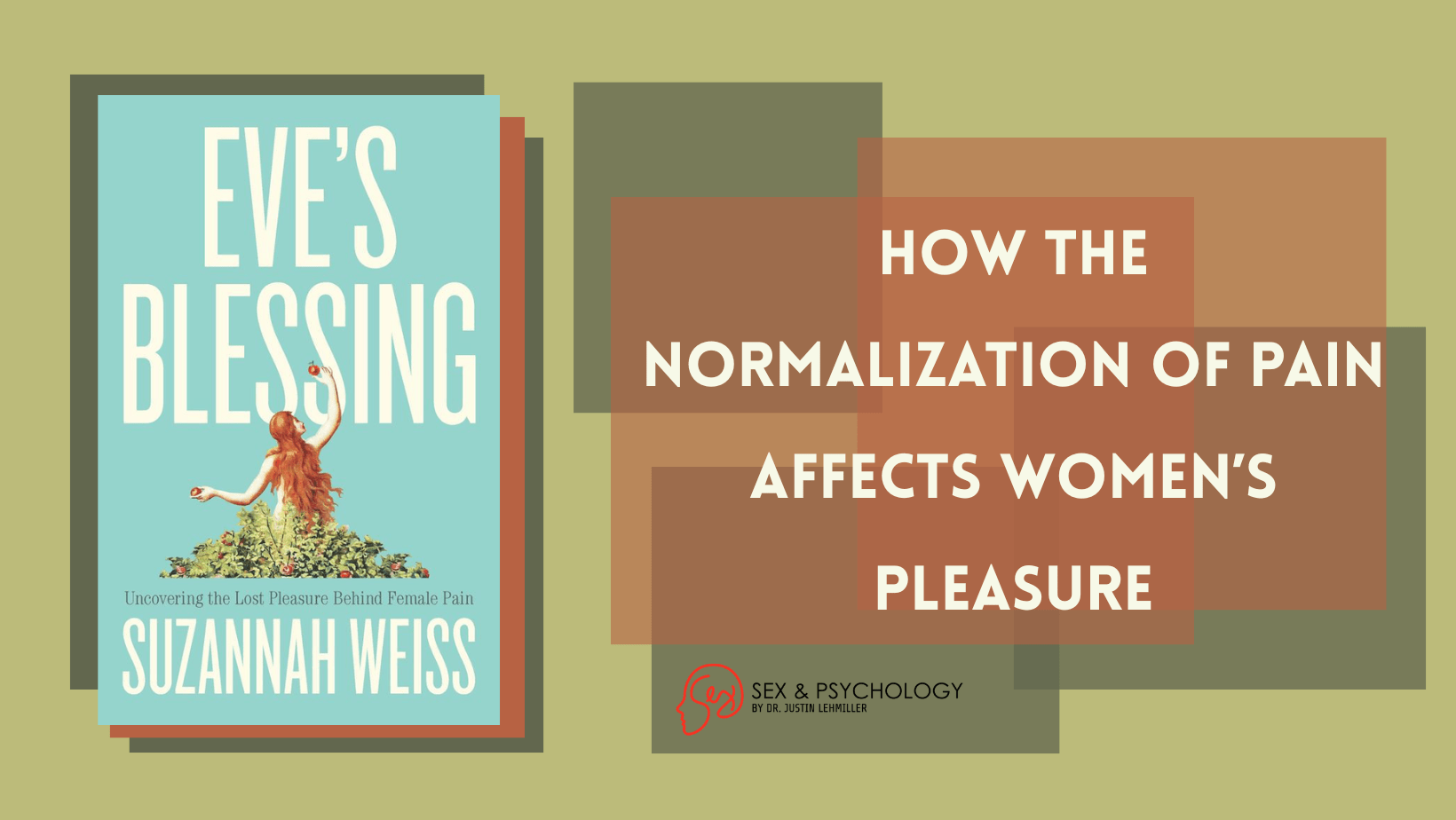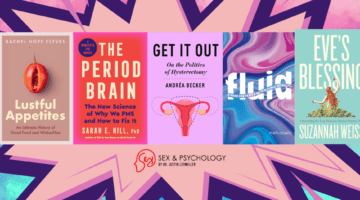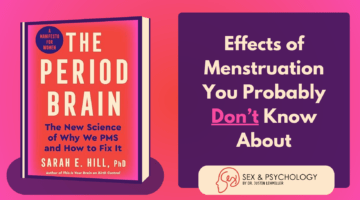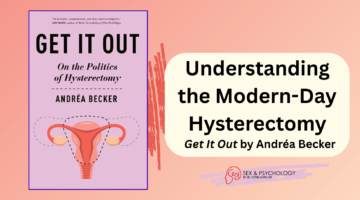How The Normalization Of Pain Affects Women’s Pleasure
October 1, 2025 by Emily Mendelson
Historically, women’s health is a subject that has been under-researched. This is especially the case when it comes to women’s reproductive health, which is a space that has both normalized pain and overlooked pleasure. Research has established that women must perform “credibility work” when seeking healthcare, which is a process wherein women need to adequately perform illness but not appear to be “too sick,” lest they be accused of faking i. [1] In this way, women with chronic pain are communicatively disenfranchised—their experiences and symptoms are dismissed and discredited by providers, making it nearly impossible to receive adequate care. [2] For many women with chronic pain, this disenfranchisement results in adverse emotional and physical consequences, exacerbating many of the symptoms they were seeking treatment for to begin with.
Approaching Women’s Pain From the Lens of Pleasure Lost
In this post, we’re going to hear from the author of Eve’s Blessing, a recently-published book that approaches women’s pain through a consideration of how historical notions of womanhood, sexuality, and pleasure have led to modern-day inequalities surrounding gender, health, and pain. Suzannah Weiss, author and resident sexologist at Fleshy, traces the history of these topics all the way from the ancient Greeks through the present day. As Weiss argues, these harmful, mythical ideologies “reverberate through hospitals and bedrooms alike, compounded by modern injustices such like rape culture, media sexualization, and media bias that keep women from enjoying their anatomy” (p. 4).
In doing so, Weiss draws from her own experiences with chronic pain and illness, as well as learning to prioritize her own pleasure through dismantling harmful myths she was taught about her own body. The stories throughout the book, while hers, are also those of many other women who she met during the process of writing the book.
Suzannah Weiss: Author of Eve’s Blessing
Suzannah was kind enough to answer some questions about the book so that we can gain some more insight into the subject of women’s pain and pleasure. Read on for our Q&A with her.
Q: Many of the stories in this book come from interviews you conducted with others. Can you tell us a little bit about how you found your participants, who you interviewed, and what you spoke about?
This book evolved organically from my relationships with colleagues, mentors, and friends. That’s what’s so cool about it — it’s a narration of my own path from pain to pleasure that interweaves the paths of many women that intersect with mine and guide me on mine. I met one of my interviewees, Sophie Lua, on a plant medicine retreat, where she shared that — like me — it took her a while to first orgasm with a partner. She became my coach, and I was inspired by how much of an about-face she’d made in her sex life, so I interviewed her on how she went from only orgasming alone to having vaginal, cervical, and multiple orgasms. Another mentor of mine, Josefina Bashout, inspired me with her story of overcoming pre-cervical cancer holistically while healing her sexuality through tantra. I interviewed her about how to experience what she calls “life as one giant orgasm,” a series of sensual delights. Other interview subjects were women like Abby Norman, Tara Langdale-Schmidt, and Sarah Ramey who have written and spoken about their journeys with chronic illness and pelvic pain and their work to advocate for healthcare reform. Langdale-Schmidt, for instance, invented a dilator to treat her vulvar pain and now sells this technology through her company VuvaTech. Ramey did a great deal of research on what’s causing the societal epidemic of chronic illness in women and shared some fascinating insights in her book The Lady’s Handbook for Her Mysterious Illness.
Q: Throughout the book, you connect the story of Adam and Eve to modern-day understandings of sex and sexuality. How did this connection come about for you? How does the story of Adam and Eve inform how we think of women’s sexuality today?
I grew up with a lot of body shame due to the myths I learned around women’s bodies during adolescence: that periods are uncomfortable, that PMS is inevitable, that sex will hurt the first time, that childbirth is excruciating, that orgasmless sex is normal. These ideas made me ashamed to be a woman. As I grew up, I learned that living in a female body was so much better than others believed it would be. And one reason we are taught many negative ideas about femaleness is because of the notion of a “curse” on Eve in the Garden of Eden, which has led many to believe in the naturalness of painful childbirth, painful periods, and even painful sex. The strange thing is, Genesis doesn’t describe a “curse” on women’s bodies. The phrase translated as “thou shalt give birth in sorrow” means something more like “thou shalt have children anxiously.” I see the curse as a metaphor for the influence of patriarchy on women’s bodies. The collective control of women’s sexuality, a paternalistic healthcare system, medical bias against women, and limits on reproductive autonomy make childbirth and living in a female body painful.
Q: Eve’s Blessing connects many historical ideas about women’s sexuality to modern-day healthcare failures for women. What stands out to you as some of the most harmful theories that have set back adequate care for treating women’s pain?
The early Ancient Greek physicians thought of women as incomplete men. Galen stated that “woman is less perfect than the man in respect of the generative parts. For the parts were formed within her when she was still a foetus, but could not because of the defect in the heat emerge and project on the outside.” Such theories spawned a tradition of medical research primarily being conducted on men. As a result, many women’s health issues are under-researched and under-diagnosed. I write about my own experience with a chronic urinary tract infection. It’s horrifying how many women with this condition are told they have an incurable illness called interstitial cystitis because standard UTI tests miss a quarter of infections. UTIs are primarily experienced by women, which largely explains the dearth of research. So women live with bladder pain for years and are prescribed medications that numb it without ever getting proper treatment. Women dealing with chronic bladder pain should look for doctors who use newer tests like PCR or broth culture tests. Another condition that gets overlooked in women due to the cultural erasure of female bodies is balanitis, a yeast infection in the clitoris. Balanitis in the penis is well known, yet when a patient reports clitoral pain consistent with balanitis, doctors shrug it off or refer the patient to physical therapy when there is a very curable infection. This stems from a view of women as concave men, with their genitals defined by the vagina and not the clitoris. The clitoris is an important organ that requires care just as much as the penis.
Q: The second half of Eve’s Blessing reframes how experiences such as periods, orgasms, and childbirth all have the potential to be positive and pleasurable. What are some ways that we can embrace some of these aspects of womanhood that are historically under-acknowledged?
As a birth doula, I am certified in orgasmic and ecstatic birth, which emphasize the role of pleasure and sensuality in childbirth. Midwives report witnessing orgasms in one in 300 births (though the real number might be higher), but many more births involve pleasure. The ecstatic and orgasmic birth movements encourage birthing in pleasant settings with supportive people and sensual elements like essential oils, candles, pools of hot water, birth balls, and self-pleasure. Most importantly, the mother has power and control over the birth. Many negative aspects of childbirth today stem from disempowerment, coercion, paternalistic attitudes, and excessive interventions in hospitals. Menstruation is another experience many women don’t enjoy for reasons related to stigma, stress, and hormonal imbalances stemming from environmental toxicity, poor nutrition, and under-researched health conditions. Positive changes before and during menstruation such as enhanced sex drive, sexual sensitivity, creativity, and intuition are even more commonly reported than PMS. I call my period my “wet week” because I enjoy the heightened arousal, natural lubrication, and increased capacity for multiple orgasms. Once we give ourselves permission to listen to our bodies, take care of ourselves, and advocate for our needs, many previously negative experiences turn positive.
To learn more, you can find Eve’s Blessing on Amazon, Barnes and Noble, Wiley, and most other places where books are sold. You can also follow Suzannah on Twitter or Instagram, and learn more about her psychotherapy and sex therapy offerings on Psychology Today.
If you have a sex question of your own, record a voicemail at speakpipe.com/sexandpsychology to have it answered on the blog or the podcast.
Want to learn more about Sex and Psychology? Click here for more from the blog or here to listen to the podcast. Follow Sex and Psychology on Facebook, Twitter (@JustinLehmiller), Bluesky, or Reddit to receive updates. You can also follow Dr. Lehmiller on YouTube and Instagram.
Image made with Canva.
References:
[1] Thompson, C. M., Babu, S., & Makos, S. (2023). A grounded theory of credibility work and illness: Explication and application to the case of women on trial in health care. Communication Research, advance online publication. https://doi.org/10.1177/00936502231184318
[2] Hintz, E. A., & Tucker, R. V. (2023). Contesting illness: Communicative (dis)enfranchisement in patient–provider conversations about chronic overlapping pain conditions. Human Communication Research, 49(2), 170–181. https://doi.org/10.1093/hcr/hqad004

Dr. Justin Lehmiller
Founder & Owner of Sex and PsychologyDr. Justin Lehmiller is a social psychologist and Research Fellow at The Kinsey Institute. He runs the Sex and Psychology blog and podcast and is author of the popular book Tell Me What You Want. Dr. Lehmiller is an award-winning educator, and a prolific researcher who has published more than 50 academic works.
Read full bio >


